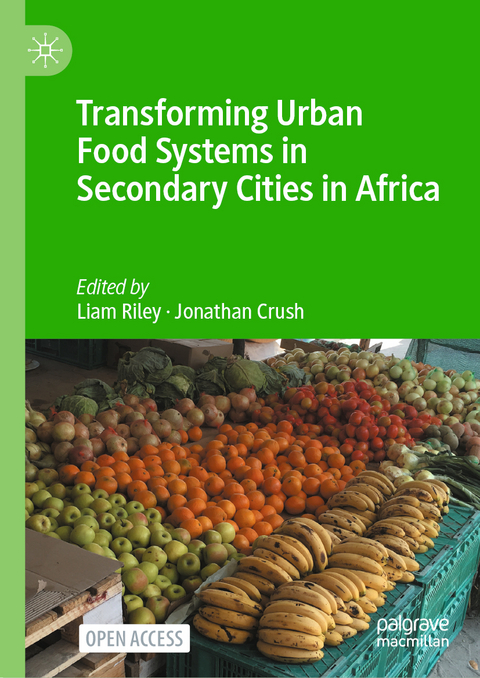
Transforming Urban Food Systems in Secondary Cities in Africa
Springer International Publishing (Verlag)
978-3-030-93071-4 (ISBN)
This book will combine this research and feature comparable case studies, intersecting trends, and shed light on broad concepts including governance, sustainability, health, economic development, and inclusivity.
This is an open access book.
Jonathan Crush is University Research Professor at Wilfrid Laurier University. After completing his schooling at Waterford/Kamhlaba United World College in Swaziland, he obtained his first degree at Cambridge University and completed his M.A. at Wilfrid Laurier University and Ph.D. at Queen's University. He has taught at the National University of Lesotho and the University of Alberta and was a member of the Queen's faculty from 1987 to 2012. In 2008, he was awarded a Queen's Research Chair, and in 2012 he joined the Balsillie School as the CIGI Chair in Global Migration & Development. Dr Liam Riley works on several inter-related projects investigating food security and food systems in Africa's rapidly growing cities. He holds a PhD (2013) and MA (2008) in Geography from Western University in London, Canada and a BA (2003) in East Asian Studies and African Studies from McGill University. Liam held a SSHRC Postdoctoral Fellowship (2014-2016) and Banting Postdoctoral Fellowship (2016-2019) at the BSIA at Wilfrid Laurier University where he is currently an Adjunct Faculty member. His work is rooted in fieldwork in Malawi, Cameroon, South Africa, and Botswana that uses a host of qualitative and quantitative research methods to investigate gendered household food strategies in urban Africa and the political economic dimensions of urban food security as a development challenge.
1. Introduction: African Secondary City Food Systems in Context.- Part 1: Food System Actors, Concepts and Governance.- 2. Understanding Secondary City Typologies: A Food Governance Lens.- 3. Practice Theory and Informal Urban Livelihoods in M'Bour, Senegal: A Case Study of Urban Cultivation.- 4. Co-Productive Urban Planning: Protecting and Expanding Food Security in Uganda's Secondary Cities.- 5. The Role of the Informal Sector in Epworth's Food System, Zimbabwe.- 6. The Enabling Environment for Informal Food Traders in Nigeria's Secondary Cities.- 7. Secondary Cities and Urban Agriculture in Sub-Saharan Africa.- Part 2: Food Security, Poverty & Livelihoods.- 8. Spatial Characteristics of Urban Food Systems and Food Retailers in Smaller Urban Areas.- 9. Food Insecurity, Food Sourcing and Food Coping Strategies in the O-O-O Urban Corridor, Namibia.- 10. Analysing Diet Composition and Food Insecurity by Socio-Economic Status in Secondary African Cities.- 11. Household Dietary Patterns and Food Security Challenges in Peri-Urban South Africa: A Reflection of High Unemployment in the Wake of Rising Food Prices.- 12. "We eat everyday but I'm perpetually hungry": Interrogating Food System Transformation and (Forced) Dietary Changes in Tamale, Ghana.- 13. Understanding Food Security and Hunger in Xai-Xai, Mozambique.- Part 3: Environments, Linkages and Mobilities.- 14. Hunger in an Agricultural City: Exploring Vulnerability in Dschang, Cameroon.- 15. Non-Timber Forest Products in Cameroon's Food System and the Impact of Climate Change on Food Security in Dschang.- 16. Accessibility of Sanitary Facilities Among Food Sellers in African Secondary Cities: Implications for Food Safety and Urban Planning Policies.- 17. Migrant Remittances and Household Food Security in Mzuzu, Malawi.- 18. Rural-Urban Migrants in Mzuzu's Informal Food Trading System.- 19. Rent as Ransom: Lodging and Food Security in Gweru, Zimbabwe.
| Erscheinungsdatum | 04.11.2022 |
|---|---|
| Zusatzinfo | XIX, 402 p. 23 illus., 19 illus. in color. |
| Verlagsort | Cham |
| Sprache | englisch |
| Maße | 148 x 210 mm |
| Gewicht | 678 g |
| Themenwelt | Naturwissenschaften ► Geowissenschaften ► Geografie / Kartografie |
| Sozialwissenschaften ► Politik / Verwaltung ► Staat / Verwaltung | |
| Sozialwissenschaften ► Soziologie | |
| Schlagworte | African secondary cities • African Secondary City Food Systems • co-productive urban planning • Food governance • Food insecurity • food security • food system governance • open access • sustainable cities • Sustainable food systems • Urban Development • Urban Food Systems • urban food systems in Africa • urban livelihoods |
| ISBN-10 | 3-030-93071-8 / 3030930718 |
| ISBN-13 | 978-3-030-93071-4 / 9783030930714 |
| Zustand | Neuware |
| Haben Sie eine Frage zum Produkt? |
aus dem Bereich


